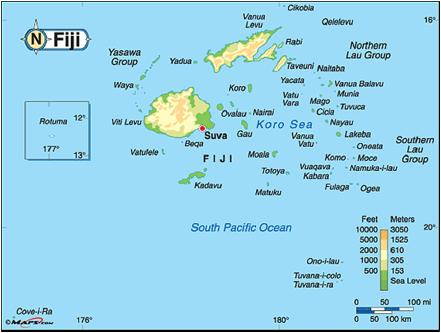Based on results of an initial scoping exercise,11 Fiji was selected as the national case study for the Pacific region. Key rationale for selection included: Fiji’s early adoption of an E-government Programme (2006) which was a first in the Pacific region, and Fiji’s high Internet penetration, relative to the rest of the region. The trajectory of the E-government Programme to date indicates that Fiji is at an early stage case study of e-government development.
Fiji is located in the south western Pacific Ocean and comprises 332 islands, one third of which are inhabited. According to the most recent census data (2007), just under half (49%) of the population (837,271) lives in rural areas. Fiji has a relatively young population, with 48% under the age of 25 and only 7.5% above the age of 60.12 In 2013, Fiji’s population was estimated at 881,100.13
Fiji is classified as a small island developing state14 with an upper middle income level15 and the country has one of the most developed economies of the Pacific Island Countries. Fiji’s 2014 Human Development Index (HDI) was 88 out of 187 countries (UNDP 2014). Fiji’s HDI value for 2013 is 0.724 which is in the high human development category. Between 1980 and 2013, Fiji’s HDI value increased by 23.4%: life expectancy at birth increased by 6.8 years; mean years of schooling increased by 4.0 years; and expected years of schooling increased by 4.9 years. Fiji’s Gross National Income per capita increased by about 23.7% between 1980 and 2013 (UNDP 2014). Fiji’s Inequality-adjusted HDI is 0.613, a reduction of 15.3% due to inequality in the distribution of the dimension indices (inequality in life expectancy, education and income).
After nearly a century as a British colony, Fiji became an independent parliamentary democracy in 1970. Since 1970, Fiji has experienced four coups (two in 1987; 2000; and 2006) and promulgated four constitutions (in 1970, 1990, 1997 and 2013). The first general election since the 2006 coup was held on September 17, 2014.
2.1 BRIEF OVERVIEW OF FIJI
FIGURE 1
MAP OF FIJI

- This comprised desk research, online call for information and key informant interviews. Desk research on e-government policy and programming in the Pacific Island Countries was conducted. The search focused on Fiji, Vanuatu, Solomon Islands and Samoa. An online call for information was posted on list serves and key informant interviews were held (one academic and one regional agency stakeholder). See Appendix C.
- Fiji Bureau of Statistics, http://www.statsfiji.gov.fj/index.php/2007-census-of-population , Retrieved 28 April 2015
- Ibid.
- http://unohrlls.org/meetings-conferences-and-special-events/fiji/, Retrieved 26 April 2015
- http://data.worldbank.org/country/fiji, Retrieved 26 April 2015
